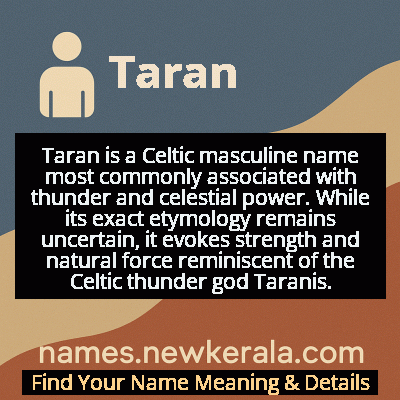Taran Name Meaning & Details
Origin, Popularity, Numerology Analysis & Name Meaning of Taran
Discover the origin, meaning, and cultural significance of the name TARAN. Delve into its historical roots and explore the lasting impact it has had on communities and traditions.
Name
Taran
Gender
Male
Origin
Celtic
Lucky Number
9
Meaning of the Name - Taran
Taran is a Celtic masculine name most commonly associated with thunder and celestial power. While its exact etymology remains uncertain, it evokes strength and natural force reminiscent of the Celtic thunder god Taranis.
Taran - Complete Numerology Analysis
Your Numerology Number
Based on Pythagorean Numerology System
Ruling Planet
Mars
Positive Nature
Generous, passionate, energetic, and humanitarian.
Negative Traits
Impulsive, impatient, moody, and can be overly emotional.
Lucky Colours
Red, maroon, scarlet.
Lucky Days
Tuesday.
Lucky Stones
Red coral, garnet.
Harmony Numbers
1, 2, 3, 6.
Best Suited Professions
Military, sports, philanthropy, leadership roles.
What People Like About You
Courage, energy, leadership, generosity.
Famous People Named Taran
Taran Noah Smith
Actor
Starred as Mark Taylor on 'Home Improvement' for eight seasons
Taran Killam
Actor/Comedian
SNL cast member and featured in numerous comedy productions
Taran Adhar
Academic
Renowned scholar in technology law and intellectual property
Name Variations & International Equivalents
Click on blue names to explore their detailed meanings. Gray names with will be available soon.
Cultural & Historical Significance
In Welsh mythology and literature, the name appears in various forms, maintaining its association with strength and authority. The persistence of this name through centuries demonstrates its deep roots in Celtic identity and the enduring appeal of mythological connections in personal naming traditions. During the Roman occupation, Taranis was sometimes equated with Jupiter, indicating his importance in the Celtic religious hierarchy and the syncretism that occurred between Celtic and Roman beliefs.
Extended Personality Analysis
Individuals named Taran are often perceived as strong-willed, dynamic, and naturally charismatic. They tend to possess an energetic presence that commands attention, much like the thunder deity from which the name derives. These individuals typically exhibit leadership qualities, confidence, and the ability to make decisive actions when needed. Their personality often combines practical intelligence with creative problem-solving skills, making them effective in both professional and personal contexts.
While they can be intense and passionate in their pursuits, they also demonstrate loyalty and protective instincts toward those they care about. The name suggests someone who is not afraid to voice their opinions and stand up for their beliefs, yet maintains a sense of fairness and justice in their interactions with others. This combination of strength and principle makes Tarans natural leaders who inspire confidence in those around them, while their occasional stormy temperament is balanced by genuine concern for others' wellbeing.
Modern Usage & Popularity
In contemporary times, Taran maintains moderate popularity as a masculine given name, particularly in English-speaking countries with Celtic heritage connections such as Wales, Scotland, Ireland, and their diasporas. The name experiences periodic resurgences, often influenced by cultural trends favoring mythological and nature-inspired names, as well as appearances in popular media like Lloyd Alexander's Chronicles of Prydain series. While not among the most common names, it enjoys steady usage among parents seeking distinctive yet historically grounded names that are easy to pronounce internationally. Its appeal lies in its strong phonetic quality and the growing interest in Celtic mythology and heritage, with recent decades seeing Taran adopted beyond traditional Celtic communities while retaining its distinctive character and cultural resonance.
Symbolic & Spiritual Meanings
Symbolically, Taran represents power, natural force, and transformative energy that cannot be contained or ignored. Like thunder that both destroys and nourishes the earth through storms that clear the air and bring life-giving rain, the name embodies the dual nature of creation and destruction inherent in natural cycles. It symbolizes authority, protection, and the ability to overcome obstacles through sheer force of will, while also representing the voice of truth that cuts through noise and distraction. The name carries strong connotations of celestial power and the uncontrollable forces of nature, suggesting someone who can weather storms and emerge stronger from challenges. In metaphorical terms, Taran represents the compelling presence that demands attention and respect—the individual who makes an impact simply by entering a room, much as thunder announces its presence long before the storm arrives.

